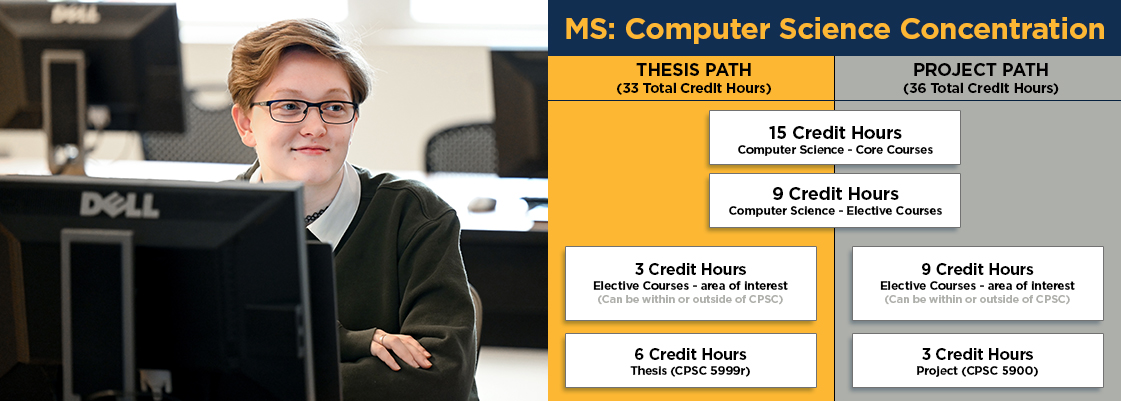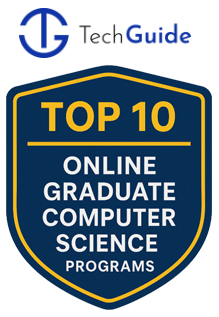MSCS: Computer Science
The University of Tennessee at Chattanooga Master of Computer Science program (MSCS) has been recognized as
one of the best online master’s degrees by Forbes Advisor, a leading information platform dedicated to
helping consumers make educated financial choices.
LEARN MORE
We’re #26 out of 48 programs for “Best Online Master’s Degrees in Computer Science for 2023”
and #15 out of 50 for “Most Affordable Online Master’s in Computer Science Programs for 2023”

M.S. Computer Science: Computer Science Concentration
Program Requirements
The CPSC M.S. program requires a student to complete a minimum of 33 semester hours of graduate work including a thesis, or 36 semester hours of graduate work including a project.
Students admitted to the program who lack academic experience in certain areas will be required to complete up to 18 hours of additional course work in mathematics and/or the computer science foundation courses listed below (CPSC 5000, 5010, and 5020, or their undergraduate equivalents) in order to gain needed competencies.
All students admitted to the program must complete 15 semester hours of required courses from the computer science core courses listed below. The program also includes 6 hours of thesis and at least 9 hours of computer science elective courses. The student (in consultation with his/her major adviser and the graduate program coordinator) can select an additional 3 hours of elective coursework in an area of interest within or outside of computer science.
Students may elect to undertake a project in lieu of a thesis. In this case, 6 additional hours of elective coursework, for a minimum total of 36 hours of graduate credit, are required. The courses used for these additional six hours are subject to the approval of the major adviser and the graduate program coordinator.
With either the thesis or project option, a minimum of 21 hours of credit must be from UTC computer science courses at the 5000 level or above (not including CPSC 5000, 5010, or 5020, which may not be used to fulfill degree requirements).
Students must maintain a minimum 3.0 grade point average and are subject to all general regulations of The Graduate School, such as those regulating admission to candidacy, transfer of credits, time limitations, thesis, and degree conferral.

Curriculum Options and Details:
View Graduate Catalog for MSCS: Computer Science Concentration
- Core Computer Science Courses
Choose 5 courses (15 credit hours) from the following courses: Subject/Crse Course Name CPSC 5100 Theory of Computer Programming Languages CPSC 5210 Design and Analysis of Computer Algorithms CPSC 5260 Introduction to Parallel Algorithms CPSC 5410 Model Analysis and Simulation CPSC 5590 Advanced Computer Networks CPSC 5700 Advanced Computer Architecture CPSC 5800 Advanced Topics in Systems Software - Computer Science Electives
Computer Science Elective Courses may be chosen from: Subject/Crse Course Name CPSC 5110 Mobile Computing CPSC 5130 Cloud Computing CPSC 5180 Programming Languages for Advanced Data Analytics CPSC 5200 Automata, Complexity, and Computability CPSC 5240 Principles of Data Analytics CPSC 5270 Advanced Database and Database Security CPSC 5440 Introduction to Machine Learning CPSC 5450 Advanced Topics in Artificial Intelligence CPSC 5460 Pattern Recognition CPSC 5500 Computer Graphics Applications and Algorithms CPSC 5530 Data Visualization and Exploration CPSC 5600 Advanced Biometrics and Cryptography CPSC 5610 Advanced Information Security Management CPSC 5620 Computer Network Security CPSC 5660 System Vulnerability Analysis and Auditing CPSC 5680 Computer Forensics CPSC 5910r Special Topics CPSC 5920r Graduate Internship in Computer Science CPSC 5997r Individual Studies - Project Information
A project typically has well-defined requirements; it is expected to be of graduate quality but is of such a nature that it can be completed within a single semester, given diligent effort on the student’s part.
Requirements are established by the faculty member who is instructor of record for CPSC 5900 and generally include interim status reports, a final written report, and a presentation/demonstration of the finished project.
Project topics may be suggested by the student, a faculty member, or an external client (e.g. a company or non-profit organization) and must be approved by the CPSC 5900 instructor.- Thesis Information
A thesis generally involves the pursuit of a more open-ended research objective, and results in the writing, oral defense, and publication of a paper of substantial length and scholarly quality. The research and writing of the thesis always requires at least two semesters, and may take longer depending on a variety of factors.
A total of at least 6 credit hours in CPSC 5999r must be successfully completed. The credits may be distributed over two or more semesters 3/3, 2/4, 4/2, 2/2/2, etc. with the proviso that the student must be enrolled for at least two semester hours of thesis during the semester that the thesis is completed and submitted to the Graduate School.
Before registering for CPSC 5999r thesis credits, the student must establish a thesis committee consisting of a chairperson and at least two other persons, all of whom must be members of the UTC graduate faculty. (See the Graduate School web site for the thesis committee appointment form and the list of graduate faculty members.) The committee must approve the student’s proposed thesis topic, the completed thesis, and the thesis defense in order for the student to receive his/her degree.
Once a student enrolls in thesis credits, he/she must continuously enroll in CPSC 5999r each semester until the thesis is completed. It is not necessary for the student to take CPSC 5999r during Summer terms unless the student plans to complete the thesis for August degree conferral.
Financial Aid and Scholarships
UTC Financial aid and scholarships are open to all students. CECS Scholarships specific to engineering and computer science students. Learn more through the links below.
How to Apply
Applying to the College of Engineering and Computer Science is easy. Simply go to the application portal, and select the application that applies to you during the start application process. Undergraduate, graduate or transfer students all use the same application portal.
Program Contact
For program information, please contact:
Dr. Yu Liang
Email: [email protected]


